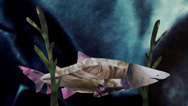Herpes and the Brain
- By Anna Rothschild
- Posted 06.04.15
- NOVA
Herpes is probably hiding in your nerve cells right now. Learn more in this episode of Gross Science.
Transcript
Herpes and the Brain
Posted: June 4, 2015
Herpes. It’s way creepier than you ever thought.
I’m Anna Rothschild, and this is Gross Science.
Herpes viruses are super common and quite diverse. If you’ve ever had cold sores, chickenpox, or mono, you’ve been infected with a herpesvirus. In fact, we know of eight different types of herpesviruses that infect humans, and if you’ve had one that infection lasts a lifetime.
That’s because herpes viruses go into what’s called a “latent phase,” which is like a state of hibernation where the virus hides in your cells. And, what I find so interesting is just where these viruses are hiding. Believe it or not, the ones that cause cold sores, genital sores, and chickenpox actually hide in neurons around your body. And this can have some pretty weird implications.
For example, if you had chickenpox as a kid, the virus might flare up later in life as the disease shingles. Shingles causes a painful rash, which appears in particular locations on your skin depending on which nerve the virus was hiding in. A friend of mine once got shingles on his left butt cheek, because the virus flared up in the nerve connected to that patch of skin. It was apparently very uncomfortable.
Because herpes lurks in your nervous system, it can sometimes make its way to your brain—though this only happens to about two in a million people. On these very rare occasions, the same virus that causes cold sores can sneak into your temporal lobes and cause a host of unpleasant effects, including death. But some people who survive are left with a very strange type of brain damage. They’re totally normal, except they’ve lost the ability to recognize whole classes of things, like animals, or colors, or tools. One survivor could no longer identify whether a drawing depicted a real animal or a fictional hybrid beast. And while I wouldn’t wish brain herpes on anyone, because of its specificity, this type of brain damage has actually revealed some secrets about how our brains store and categorize information.
Anyway, scientists are learning more about these viruses all the time. In the past few years, they’ve begun to understand how to lure herpes out of the nervous system. And hopefully one day they’ll be able to stop all eight types of herpes in their tracks.
Ew.
Credits
PRODUCTION CREDITS:
- Host, Writer, Animator, Editor
- Anna Rothschild
- DP, Sound, Intern Extraordinaire
- Elizabeth Gillis
- Many thanks to Dr. Bryan Cullen.
- Lucky Charms
- Music Provided by APM
IMAGES
- Dermatomes and cutaneous nerves – posterior
- Wikimedia Commons/Mikael Häggström
- Herpes labialis – opryszczka wargowa
- Wikimedia Commons/Jojo
- Herpes zoster chest
- Wikimedia Commons/Fisle
- Herpesviridae EM PHIL 2171 lores
- Wikimedia Common/CDC
- Main symptoms of Infectious mononucleosis
- Wikimedia Commons/ Mikael Häggström
- Windpocken
- Wikimedia Commons/Thomas Netsch
SFX
- Cockroaches
-
Freesound/StateAardvark
(used with permission from author) - Squeak Pack/squeak_10
- Freesound/Corsica_S
- snoring long
- Freesound/pencilgame1
- Jacob’s Ladder/Jacobs ladder 007
- Wikimedia Common/DJ Chronos
- Wink
- Freesound/bennychico11
- Swishes
- Freesound/pogotron
- Real?_world_recordings/lake ducks squawking at night
- Freesound/Tomlija
- Oink
- Freesound/payattention
- Bubbling Popping
- Freesound/Ch0cchi
- Produced by WGBH for PBS Digital Studios
IMAGE
- (main image: Brain and Virus)
- ©WGBH Educational Foundation 2015
Sources
Want more info?
Check out BrainCraft!
https://www.youtube.com/user/braincraftvideo
Kean, S. (2014). The Tale of the Dueling Neurosurgeons. New York, NY: Little, Brown and Company.
Info on the shingles vaccine:
http://www.cdc.gov/vaccines/vpd-vac/shingles/
No place to hide for herpes virus (New Scientist):
http://bit.ly/1Ray7iq
Related Links
-

Gross Science
Bizarre stories from the slimy, smelly, creepy world of science.
-

When Shark Fetuses Attack
Sand tiger shark fetuses eat their siblings in the womb.
-

Can Cocaine Make Your Ears Rot?
Cocaine is being mixed with a dangerous drug called levamisole.
-

What Does Disease Smell Like?
Sometimes doctors can diagnose you based on how you smell.

